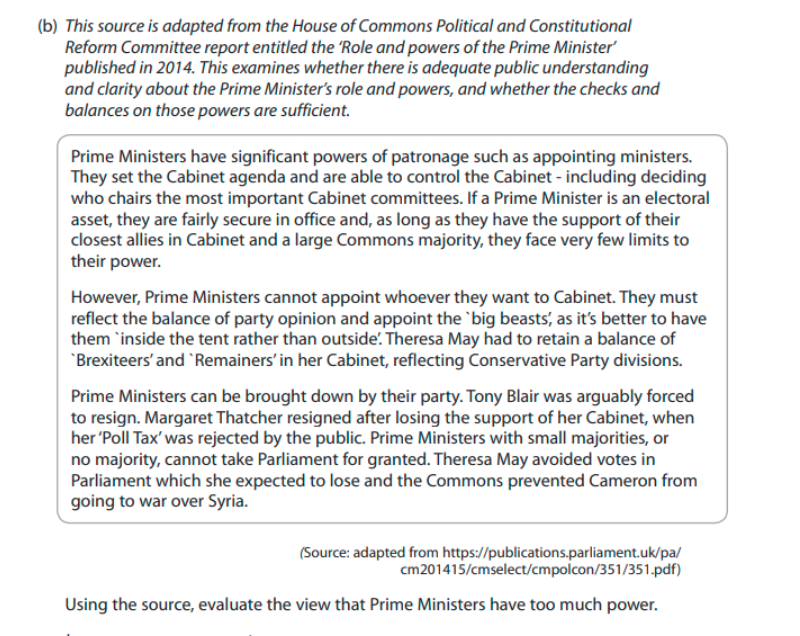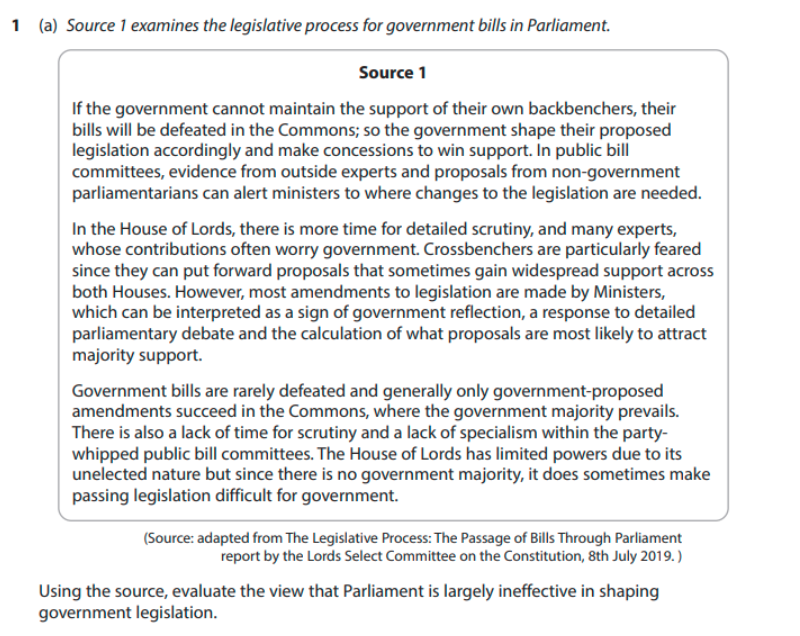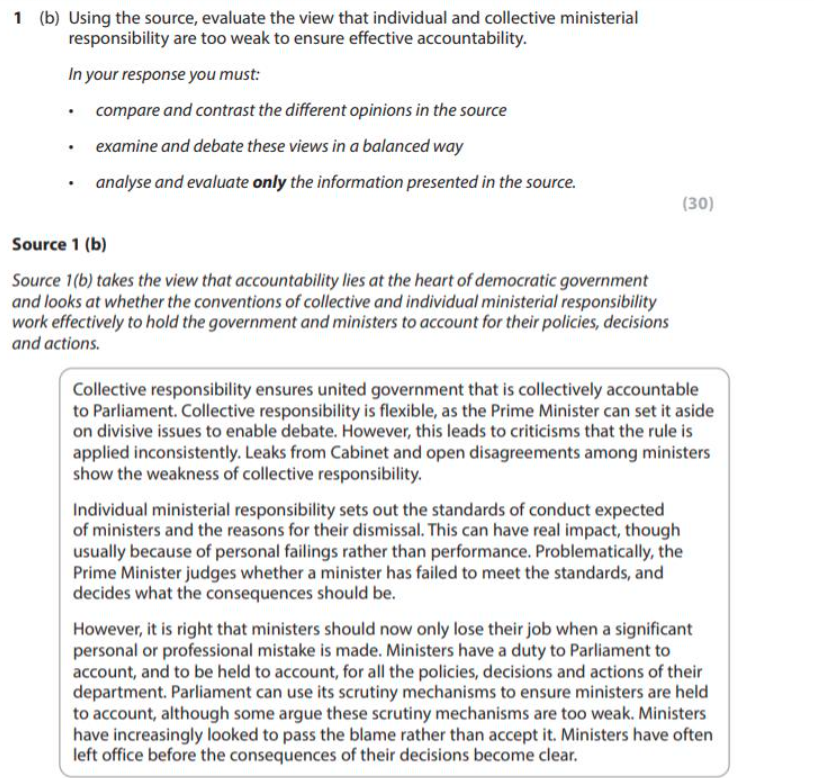
Past Paper Questions
Ministerial responsibility (accountability, democratic governance, policy efficacy and strong gov)
PM as too powerful (cabinet, HoL, backbenchers)
Cabinet Government
Power of executive
IMR but its inconsistent — does it extend to everyone — CMR but limits
Individual Ministerial Responsibility
Although enforced by convention, individual ministerial responsibility has been somewhat effective historically, holding ministers to account for their behaviour
Sir Thomas Dugdale, resigned over the Crichel Down affair (despite it arguably being the responsibility of civil servants)
Amber Rudd resigned over misleading parliament
New Labour also started a convention of publishing a ministerial code, improving the extent of ministerial responsibility
BUT
The enforcement of IMR is limited and inconsistent, significantly undermining it as a convention
Michael Howard didn’t resign after Pankhurst jail breakouts, but instead sacked the general director of prison services
More significantly, IMR has limited effects long-term e.g. Priti Patel resigned in 2017 but became home secretary in 2019, and refused to resign over accusations of bullying civil servants
IMR is ultimately undermined as it isn’t consistently applied and relies excessively on the honour of ministers. It also lacks any actual long-term consequences, undermining its efficacy and thus it no longer adequately accounts for behaviour
Doesn’t extend to everyone
‘Big beasts’ or people who simply refuse to resign can’t be held to the standard of individual ministerial responsibility
although Matt Hancock resigned for breaking his own covid laws in 2021, Sunak, Johnson nor 124 of the others involved in partygate immediately resigned
Norman Lamont didn’t resign after black Wednesday
BUT
when influential figures/prime ministers don’t resign it can have significant impacts on re-election chances
Major’s government were severely damaged by their failed economic incompetence and the actions of Lamont
Johnson eventually faced collapse of his government after Covid and partygate
Nevertheless, this is a pretty big contingency to rely on, still shows that IMR itself as a convention doesn’t work
Collective Ministerial Responsibility
CMR is the principle that governments should be united on decisions publicly, and that if a government loses a vote of no confidence everyone resigns
effective at ensuring public unity e.g. Sunak and Javid were divided over lateral flow tests but publicly agreed about the policy when it was decided
This is important because it makes the government a cohesive unity and allows for responsibility towards the public (if the government makes a mistake, people can’t just say it wasn’t their fault)
when CMR is ignored it can actually demonstrate the integrity of ministers, perhaps their valuing of the public/their electors as well e.g. Robin Cook resigning over Iraq war, Ian Duncan Smith resigning over cuts to disability tax
BUT
even if there is an appearance of CMR, this is largely undermined behind closed doors
ministers can brief media against each other e.g. Sunak and Johnson, Brown and Blair
especially an issue when the minister is a ‘big beast’ e.g. Johnson who wrote against May, briefed against her, caused problems when he resigned
even if CMR looks like its working it is often largely undermined and the public are aware of its limits, particularly a recent thing with increasing divides in parties, media influence and polarisation
There is strong evidence to suggest that, whilst limitations do exist on the prime minister’s power, these are often ineffective and the PM as a role is one with too much power. Nevertheless, it can be compellingly suggested that this increase in power is not a trend with recent prime ministers, but rather fluctuates depending on individual PMs and the size of their majority. As a result, many (not just recent PMs) have become too powerful.
Limiting Power of the Cabinet:
20-25 people, acts as an extension, limits their power
Thatcher’s resignation prompted by her cabinet’s support for Heseltine and speech of Geoffrey Howe
Harold Wilson faced similar cabinet rebellions after limits on trade unions
Cabinet can have a strong influence on PM and even prompt them to resign (as seen with Thatcher and Blair)
Furthermore, evident in recent years
Johnson resigned as PM after series of high profile resignations
BUT
power of cabinet can be hugely limited, restricting their influence on the PM
this has arguable been a feature of more recent cabinets
pre-1960s, used to meet twice a week, now only one hour per week
can also be replaced e.g. increased use of sofa cabinet and spatial leadership
decreased involvement in PM action and decisions
reduced role has made PM more powerful but this depends on individual PMs and more significant factors such as their strength in parliament
Limiting Power of HoL
Arguably much more consistent than the PM as a less directly appointed body
2021-2022 faced no defeats in Commons but 133 in Lords
can enforce successful amendments on prime minister’s policies e.g. EVEL, sunday trading, free school meals
BUT
as an unelected body their power is limited (democratically justified but in turn strengthens PM)
furthermore these limits have increased over time
amendments cannot be forced e.g. article 50 defeated twice, still pushed through
similar in regards to Rwanda policy → highlights limit of Lords and also received no other party’s support in Commons
essential reforms such as HoL acts and Salisbury convention: ensure democracy and representation of people but also mean PM’s power goes more unrestrained
Furthermore, certain PMs have influenced make-up of Lords, such as Cameron appointing 16 political allies and appointment of Crudas by Johnson
HoL is not very effective, especially recently, PM has too much power
Limiting power of Backbenchers:
May had 13 MPs rebel over no deal Brexit plans
Coalition vs Blair - 35% vs 28%
In the UK, the PM relies entirely on party support and if they lose this they lose all power (demonstrated in vote of no confidence resignations)
BUT
backbench rebellions are most common in weaker governments with smaller majorities (e.g. Major and May)
it is not recent PMs who have become too powerful but PMs with huge majorities
Exacerbated through FPTP and winner’s bonus
Tony Blair calling an early election to gain a 166-person majority - also one of the most notably powerful PMs in history
minority government like May faced far more rebellions, same applied to coalition (e.g. Cameron forced to make Nick Clegg deputy PM, suspension of collective ministerial responsibility)
how powerful a PM is depends on their majority
devolution, HoL reforms, supreme court, voting reforms (not happened)
the cabinet but increasingly a sofa government, the HoL but can influence makeup and limited constitutionally, most limited by backbenchers but FPTP
The cabinet, composed of around 20 to 25 ministers, should play a vital role in supporting the PM, debating and initiating legislation and limiting the sole power of the PM. While factors such as the power of the PM to choose the cabinet, the ability to rely on policy advisers outside of the cabinet and the shift towards presidentialism among PMs suggests that the Prime Minister can dominate the cabinet, this is not entirely unrestrained as they still fundamentally depend on the continued support of what tends to be an ideologically diverse cabinet
Source Questions



Ministerial responsibility (accountability, democratic governance, policy efficacy and strong gov)
PM as too powerful (cabinet, HoL, backbenchers)
Cabinet Government
Power of executive
IMR but its inconsistent — does it extend to everyone — CMR but limits
Individual Ministerial Responsibility
Although enforced by convention, individual ministerial responsibility has been somewhat effective historically, holding ministers to account for their behaviour
Sir Thomas Dugdale, resigned over the Crichel Down affair (despite it arguably being the responsibility of civil servants)
Amber Rudd resigned over misleading parliament
New Labour also started a convention of publishing a ministerial code, improving the extent of ministerial responsibility
BUT
The enforcement of IMR is limited and inconsistent, significantly undermining it as a convention
Michael Howard didn’t resign after Pankhurst jail breakouts, but instead sacked the general director of prison services
More significantly, IMR has limited effects long-term e.g. Priti Patel resigned in 2017 but became home secretary in 2019, and refused to resign over accusations of bullying civil servants
IMR is ultimately undermined as it isn’t consistently applied and relies excessively on the honour of ministers. It also lacks any actual long-term consequences, undermining its efficacy and thus it no longer adequately accounts for behaviour
Doesn’t extend to everyone
‘Big beasts’ or people who simply refuse to resign can’t be held to the standard of individual ministerial responsibility
although Matt Hancock resigned for breaking his own covid laws in 2021, Sunak, Johnson nor 124 of the others involved in partygate immediately resigned
Norman Lamont didn’t resign after black Wednesday
BUT
when influential figures/prime ministers don’t resign it can have significant impacts on re-election chances
Major’s government were severely damaged by their failed economic incompetence and the actions of Lamont
Johnson eventually faced collapse of his government after Covid and partygate
Nevertheless, this is a pretty big contingency to rely on, still shows that IMR itself as a convention doesn’t work
Collective Ministerial Responsibility
CMR is the principle that governments should be united on decisions publicly, and that if a government loses a vote of no confidence everyone resigns
effective at ensuring public unity e.g. Sunak and Javid were divided over lateral flow tests but publicly agreed about the policy when it was decided
This is important because it makes the government a cohesive unity and allows for responsibility towards the public (if the government makes a mistake, people can’t just say it wasn’t their fault)
when CMR is ignored it can actually demonstrate the integrity of ministers, perhaps their valuing of the public/their electors as well e.g. Robin Cook resigning over Iraq war, Ian Duncan Smith resigning over cuts to disability tax
BUT
even if there is an appearance of CMR, this is largely undermined behind closed doors
ministers can brief media against each other e.g. Sunak and Johnson, Brown and Blair
especially an issue when the minister is a ‘big beast’ e.g. Johnson who wrote against May, briefed against her, caused problems when he resigned
even if CMR looks like its working it is often largely undermined and the public are aware of its limits, particularly a recent thing with increasing divides in parties, media influence and polarisation
There is strong evidence to suggest that, whilst limitations do exist on the prime minister’s power, these are often ineffective and the PM as a role is one with too much power. Nevertheless, it can be compellingly suggested that this increase in power is not a trend with recent prime ministers, but rather fluctuates depending on individual PMs and the size of their majority. As a result, many (not just recent PMs) have become too powerful.
Limiting Power of the Cabinet:
20-25 people, acts as an extension, limits their power
Thatcher’s resignation prompted by her cabinet’s support for Heseltine and speech of Geoffrey Howe
Harold Wilson faced similar cabinet rebellions after limits on trade unions
Cabinet can have a strong influence on PM and even prompt them to resign (as seen with Thatcher and Blair)
Furthermore, evident in recent years
Johnson resigned as PM after series of high profile resignations
BUT
power of cabinet can be hugely limited, restricting their influence on the PM
this has arguable been a feature of more recent cabinets
pre-1960s, used to meet twice a week, now only one hour per week
can also be replaced e.g. increased use of sofa cabinet and spatial leadership
decreased involvement in PM action and decisions
reduced role has made PM more powerful but this depends on individual PMs and more significant factors such as their strength in parliament
Limiting Power of HoL
Arguably much more consistent than the PM as a less directly appointed body
2021-2022 faced no defeats in Commons but 133 in Lords
can enforce successful amendments on prime minister’s policies e.g. EVEL, sunday trading, free school meals
BUT
as an unelected body their power is limited (democratically justified but in turn strengthens PM)
furthermore these limits have increased over time
amendments cannot be forced e.g. article 50 defeated twice, still pushed through
similar in regards to Rwanda policy → highlights limit of Lords and also received no other party’s support in Commons
essential reforms such as HoL acts and Salisbury convention: ensure democracy and representation of people but also mean PM’s power goes more unrestrained
Furthermore, certain PMs have influenced make-up of Lords, such as Cameron appointing 16 political allies and appointment of Crudas by Johnson
HoL is not very effective, especially recently, PM has too much power
Limiting power of Backbenchers:
May had 13 MPs rebel over no deal Brexit plans
Coalition vs Blair - 35% vs 28%
In the UK, the PM relies entirely on party support and if they lose this they lose all power (demonstrated in vote of no confidence resignations)
BUT
backbench rebellions are most common in weaker governments with smaller majorities (e.g. Major and May)
it is not recent PMs who have become too powerful but PMs with huge majorities
Exacerbated through FPTP and winner’s bonus
Tony Blair calling an early election to gain a 166-person majority - also one of the most notably powerful PMs in history
minority government like May faced far more rebellions, same applied to coalition (e.g. Cameron forced to make Nick Clegg deputy PM, suspension of collective ministerial responsibility)
how powerful a PM is depends on their majority
devolution, HoL reforms, supreme court, voting reforms (not happened)
the cabinet but increasingly a sofa government, the HoL but can influence makeup and limited constitutionally, most limited by backbenchers but FPTP
The cabinet, composed of around 20 to 25 ministers, should play a vital role in supporting the PM, debating and initiating legislation and limiting the sole power of the PM. While factors such as the power of the PM to choose the cabinet, the ability to rely on policy advisers outside of the cabinet and the shift towards presidentialism among PMs suggests that the Prime Minister can dominate the cabinet, this is not entirely unrestrained as they still fundamentally depend on the continued support of what tends to be an ideologically diverse cabinet
Source Questions


